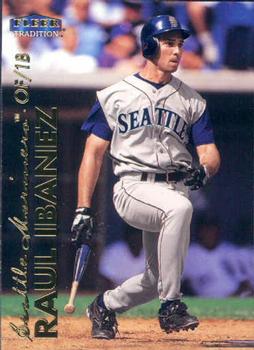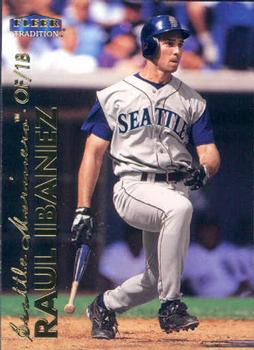April 29, 1999: Mariners’ 22-run salute levels the Tigers
 On the morning of March 26, 2000, more than 4,450 pounds of dynamite strung along a 21.6-mile web of cord girding Seattle’s Kingdome were detonated, and the only home the Seattle Mariners had ever known came tumbling down, reduced to rubble in less than 20 seconds.1 Tremors in the earth caused by the blast measured 2.3 on the Richter scale.
On the morning of March 26, 2000, more than 4,450 pounds of dynamite strung along a 21.6-mile web of cord girding Seattle’s Kingdome were detonated, and the only home the Seattle Mariners had ever known came tumbling down, reduced to rubble in less than 20 seconds.1 Tremors in the earth caused by the blast measured 2.3 on the Richter scale.
But less than 11 months earlier, the occupants of the much-maligned structure rehearsed for that day by igniting a historic blast of their own. Playing the role of doomed concrete pillars on the afternoon of April 29, 1999, were the Detroit Tigers, and when the smoke had cleared, the Mariners had put a charge into the crowd and a few entries in the team’s record book with a spectacular 22-6 demolition job.
The Mariners were a sub-.500 team when they took the field for the finale of the four-game set with Detroit. Losses to the Tigers in the first two contests (during which Seattle managed only a single run), followed by an 8-6 win gave Seattle a 9-12 mark.
The 22,078 customers who settled into their seats for the Thursday matinee had little reason to expect fireworks, let alone that the Mariners would tally one run for every thousand of them who entered. Seattle had been without slugging shortstop Alex Rodriguez since the season’s second game and had cracked double figures only once in the young campaign. On the other hand, all of Seattle’s wins to date had come in pairs, so there was reason for optimism.
Baseball being the most episodic of games, it isn’t necessarily surprising that eight of the nine innings, or certainly seven, of the most sustained barrage in Mariners history were thoroughly unremarkable. Detroit scored a run in the second on three singles, the last by Bill Haselman to plate Juan Encarnacion. Seattle drew even in the home half when David Segui scored on a grounder to third by Russ Davis, then fell behind again in the third on Damion Easley’s solo home run.
It was still essentially a pitchers’ duel when the pivotal fifth opened. Detroit starter Dave Mlicki had been cruising, while Seattle’s Butch Henry was also still on the mound, having scattered five singles and a walk in addition to Easley’s homer. But two singles and two doubles spelled an end to Henry’s night, and after reliever Ken Cloude surrendered another hit, to Karim Garcia, four runs had crossed the plate and the Tigers were in the driver’s seat.
Because of Rodriguez’s absence, Seattle had shuttled several players in and out of the shortstop position in the previous few weeks. The latest, Rafael Bournigal, hadn’t even been with the team for 48 hours, yet he got the rally started with a leadoff double to left field. Brian Hunter, a native of the Pacific Northwest who was traded from Detroit to Seattle a day after Bournigal arrived, followed with a single. The Mariners loaded the bases on a walk to David Bell before Bournigal scored on a force out at second by Ken Griffey Jr.
When a team pushes across 22 runs in a nine-inning game, there can be no shortage of offensive highlights, but it was a defensive play – one not made, by Detroit – that flipped this game from the mundane to the remarkable. Edgar Martinez was up next, and with runners at the corners hit a grounder to Dean Palmer at third. Palmer gloved the ball, but not cleanly, and the bobble allowed Hunter to dash home. It was the only error made by either team in the game.
“With that double-play ball right there, we still would have led 6-2,” Tigers manager Larry Parrish said. “I know he feels terrible about it.”2
Instead, they had a 6-3 lead and were about to discover new dimensions of the word “terrible.” Segui and Jay Buhner were both walked, the latter by C.J. Nitkowski, who had just entered in place of Mlicki. Buhner was the only batter Nitkowski faced, yet he was saddled with the loss when Buhner eventually came around to score the go-ahead run. He was philosophical about it in postgame comments. “I pitched just as bad as everyone else did – I just didn’t do it for as long,” said Nitkowski.3
For a while the Mariners continued to inflict death by a thousand cuts. Mel Rojas replaced Nitkowski, but with the bases loaded he had no margin for error. He plunked Davis with a pitch, and Martinez scored. Tom Lampkin hit a sacrifice fly to deep left field, and Segui crossed the plate. Bournigal became the first Mariner since Rodriguez in July 1997 with two hits in one inning, singling to score Buhner.4 Hunter became the second moments later, when his single drove Davis home to put Seattle in front 8-6. When Griffey stepped to the plate for the second time in the inning, there was no place to put him.
Having jabbed Detroit silly, it was time for the haymaker: Griffey, swinging from the heels, obliged with a 405-foot wallop down the right-field line for the grand slam that put an emphatic exclamation point on the inning. These last four runs made it 11 for the inning and completed the reversal of a 6-1 deficit into a 12-6 advantage. The Mariners had never scored that many runs in a single frame. Detroit, with a considerably longer history than Seattle, had gone 40 seasons since giving up that many, in an 11-4 pummeling by the Chicago White Sox on September 2, 1959.5
The Mariners kept their foot on the gas in the sixth, tacking on another half-dozen runs. Buhner and Davis laced back-to-back doubles with one out, and after Lampkin was hit with a pitch, Bournigal smacked the third double of the inning. Moments later, Bell homered to deep left field. Griffey, not to be outdone, followed with his second home run in as many innings. Rojas struck out Martinez to stem the bleeding. The beleaguered Rojas had been mauled for 11 runs in his 1⅔ innings of work, and Parrish voiced his regret for having to leave him in. “No manager likes to do that to a pitcher,” he said. “I wish I could have taken my knuckler out there and pitched.”6
Instead, he went to his bullpen to start the seventh inning, and left-hander Sean Runyan was touched for a home run by pinch-hitter Matt Mieske. When Seattle came to bat in the eighth, the only real question remaining was whether they could break their record of 19 runs in a game, accomplished twice against the Texas Rangers, on June 28, 1996, and May 20, 1994.7 Todd Jones was tasked with keeping the Mariners in check, but consecutive singles by Raul Ibanez, Martinez, and Segui and a two-run double by Davis put three more runs in the bank and finally brought down the curtain on the scoring.
In true managerial fashion, Lou Piniella expressed greater satisfaction with team hustle than with the sheer magnitude of the barrage. On Palmer’s critical fifth-inning error, he still got off a throw to second, but Griffey beat it to the bag, extending the inning and delighting his skipper. “If Junior doesn’t go in hard, we don’t go on to score extra runs,” he said. “We did a lot of little things to make the inning continue.”8 Not that Piniella wasn’t pleased with the “big things” his team accomplished on offense. “We’re capable of hitting like that – I’ve said that all along,” he said. “We just broke out. We had good hitting sprinkled all throughout our lineup today.”9 Seattle’s 22-run salute represented the most runs scored by a team in an American League game that season. (Baltimore duplicated the achievement in a 22-1 interleague victory over Atlanta.)
When Davis landed at second base in the eighth inning after driving in the final two runs of the game, he stopped to look up at the Kingdome’s replay screen and saw a single word dancing across it in giant letters, over and over again: “Unbelievable.” Considering that the team had gone 15 innings without a run earlier in the series, it was hard to disagree. “That’s something you might see in football,” he joked about the onslaught. “But never in baseball.”10
Well, almost never.
Sources
In addition to the sources cited in the Notes, the author consulted Baseball-Reference.com. He also would like to thank Thomas Brown for his assistance with research materials provided.
Notes
1 Robert L. Jamieson Jr., “Gone in 16.8 Seconds – Perfect Demolition Leaves Dome a Fallen Souffle,” Seattle Post-Intelligencer, March 27, 2000.
2 Tom Gage, “Tigers Notebook: Hunter Gets Three Hits in His Debut with Mariners,” Detroit News, April 30, 1999: 5E.
3 Tyler Kepner, “Mariners Set Club Record for Runs,” Seattle Post-Intelligencer, April 30, 1999.
4 Bob Finnigan, “Record-Breaker: M’s Catch 22,” Seattle Times, April 30, 1999.
5 “It’s History,” Flint Journal, April 30, 1999.
6 Tom Gage, “Mariners 22, Tigers 6: Tigers Get Trounced,” Detroit News, April 30, 1999.
7 Finnigan.
8 Finnigan.
9 Corey Brock, “Mariners Erupt for 22 Runs – Seattle Sets Club Mark for Most Runs in Game,” Tacoma News Tribune, April 30, 1999: C1.
10 Brock.
Additional Stats
Seattle Mariners 22
Detroit Tigers 6
Kingdome
Seattle, WA
Box Score + PBP:
Corrections? Additions?
If you can help us improve this game story, contact us.


